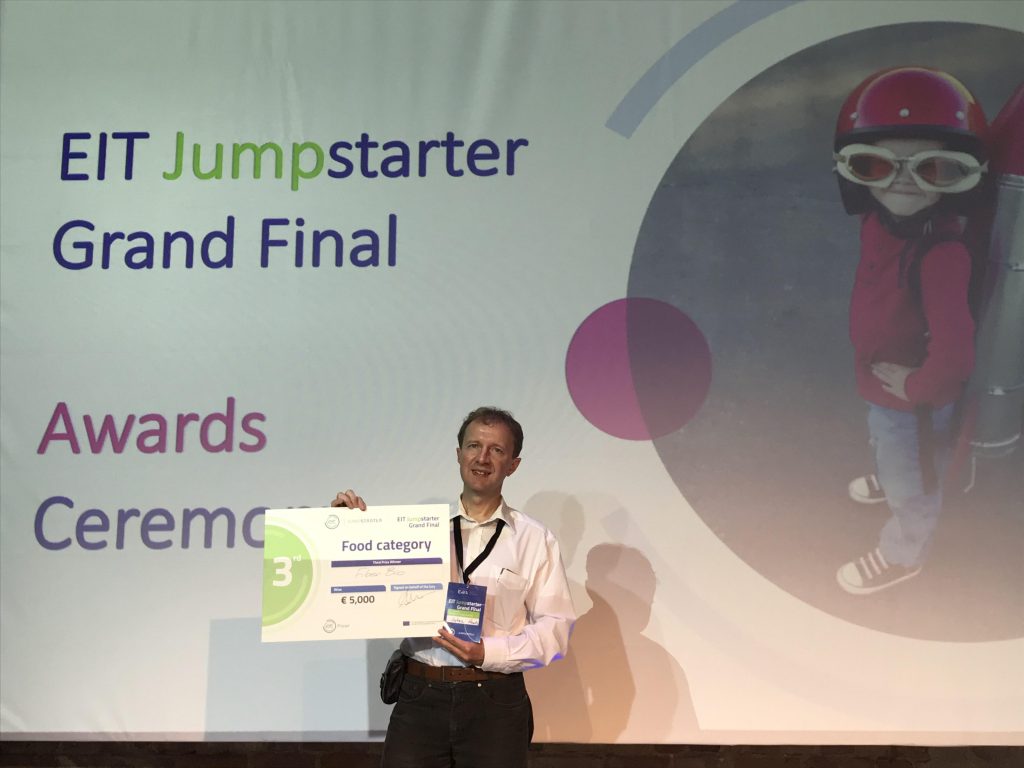The team of Fibervar Ltd. from Kolozsvár (Cluj-Napoca in Romanian) won 3rd place at the European Institute of Innovation and Technology (EIT) Jumpstarter competition, organized by EIT Food on November 14 in Riga. The FiberBio snack, developed by Dr. Péter Hantz, Tímea Novák, and István Benedek is made with an innovative technology that upcycles the fibers discarded during the production of fruit juice and vegetable oil. The product could help to prevent a series of diseases caused by, among other factors, low-fiber diets of today.
According to statistics, the European population consumes about half of the necessary amount of dietary fibers. This is one of the reasons why obesity, diabetes, bowel diseases, and cardiovascular diseases have reached epidemic dimensions; 10% of the population suffers from diabetes, and 20% is obese.
A key factor in maintaining our health is the gut microbiome – the microbes populating mainly the large intestine. This microbial community is jeopardized by low-fiber diets – something FiberBio could counteract, as the bar is low in sugar and made out of pressed apple, carrot, beetroot, and hemp pomace. The team behind this healthy and tasty snack is Péter Hantz, Senior Researcher at University of Pécs, Institute of Biophysics; Tímea Novák, student at University of Veterinary Medicine and Agronomy of Kolozsvár; and István Benedek, marketing and communication specialist at Babeș–Bolyai University. Fibervar Ltd. was founded early this year, after another idea of Péter Hantz won a grant.
“It started as a hobby on bee pollen, and to my surprise, I won a Diaspora startup grant organized by ROVE (Association for Business Promotion in Romania) and the LAM foundation to produce and commercialize this innovation. In the meantime, while walking in a shopping center in Kolozsvár, I was annoyed by the waste of fruit fibers, and I started to think about a natural solution to save them. We found the solution in molecular gastronomy, which I learned about in a research team coordinated by Professor Hervé, a French scientist who works for the Institut National de la Recherche Agronomique at AgroParisTech, in Paris, France], and I also used my knowledge in colloid science. It turned out that this idea raised a much higher interest than the bee pollen extracts, so we reconfigured our business plan,” Hantz, Chief Executive Officer (CEO) of FiberBio, told TransylvaniaNow. “Our research resulted in a healthy and tasty snack with a good consistency and outstandingly high fiber and relatively low sugar content. We are positive that it will gain popularity and will be an alternative for sugary, fatty, salty party snacks as well. Our success will hopefully start a trend to upscale vegetable fibers discarded during juice and oil production,” he added.
When we asked him, as a researcher, why he entered the food business, Hantz told TransylvaniaNow he enjoyed the research and found it important to develop a snack that could help to overcome non-communicable epidemic diseases and revert the waste of dietary fibers. He also thought this was a good business opportunity with high added value that could not be copied easily.

Hantz told TransylvaniaNow that he hasn’t seen studies that reveal all the factors behind non-communicable epidemics: “Most of the causes represent a problem of civilization: We have easy access to high-sugar, high-calorie foods, which we are evolutionarilly encoded to like. We also have less access to raw vegetables and consume a lot of food with preservatives, which is also not good for our gut microbiome. Other aspects are associated with gastronomical culture, for example, certain Eastern European countries, like Bulgaria or Hungary, consume fewer fibers. Social factors play a role as well. For example, in Germany the less educated and relatively poor Turkish people have an outstandingly unhealthy diet,” he said.
It is true that a healthy lifestyle is more and more popular, but unfortunately this trend is quite limited to the more educated classes, Hantz told TransylvaniaNOW. “Better education would be a key aspect to ameliorate the problem as well,” he added.
Péter Hantz and his team just won 3rd place and the accompanying financial support in Riga, at the European Institute of Innovation and Technology (EIT) Jumpstarter competition. The team will start the production of FiberBio as soon as possible, but, unfortunately, bureaucracy hinders them. “Indeed, you can register a company overnight in Romania, but this is just the tip of the iceberg. We haven’t been able to get all the certificates since April,” Hantz said.
The team is not only working on FiberBio. They also won a WORTH grant to develop a disruptively new ergonomic chair for sedentary workers. This project will be completed early next year. “Another invention, which hopefully will turn into innovation, is focused on decreasing environmental load. As I mentioned, it was not trivial at all to find a good consistency for our snack. During our experiments, we discovered a material made mostly of apple pomace, which was so strong that our dog could hardly chew it. I immediately realized that, with a trick of molecular gastronomy, this could result in excellent stuff for the fabrication of edible or at least degradable dishes, which could replace disposable plastic dishes. This project of ours is still in development phase. Besides these, we have some interesting projects on microbiology for use in food analytics and food microbiology with a focus on the so-called VBNC bacteria,” Hantz added.
Title image: Peter Hantz and his team presenting the snack. Photo: ebsradio.ro